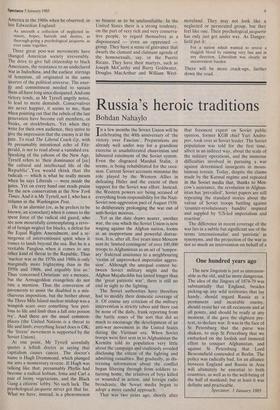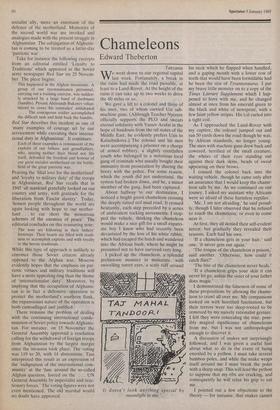Russia's heroic traditions
Bohdan Nahaylo
In a few months the Soviet Union will be celebrating the 40th anniversary of 'the victory over Fascism'. Preparations are already well under way for a grandiose
exercise in unadulterated chauvinism and laboured extolment of the Soviet system. Even the disgraced Marshal Stalin, it seems, is being rehabilitated for the occa- sion. Current Soviet accounts minimise the role played by the Western Allies in defeating Hitler and the extent of their support for the Soviet war effort. Instead, the Western powers are being accused of everything from responsibility for the Nazi- Soviet non-aggression pact of August 1939, to deliberately prolonging the war out of anti-Soviet motives.
Yet as the date draws nearer, another war, the one which the Soviet Union is now waging against the Afghan nation, looms as an inopportune and powerful distrac- tion. It is, after all, five years since Moscow sent its 'limited contingent' of over 100,000 troops to Afghanistan as an act of 'tempor- ary' fraternal assistance to a neighbouring 'victim of unprovoked imperialist aggres- sion'. Although the unequal contest be- tween Soviet military might and the Afghan Mujaheddin has lasted longer than the 'great patriotic war', there is still no end in sight to the fighting.
The Soviet authorities have therefore had to modify their domestic coverage of it. Of course any criticism of the military intervention is strictly taboo and there can be none of the daily, frank reporting from the battle zones of the sort that did so much to encourage the development of an anti-war movement in the United States during the Vietnam era. When Soviet troops were first sent in to Afghanistan the Kremlin told its population very little about the campaign and studiously avoided disclosing the extent of the fighting and admitting casualties. But gradually, as dis- tressing information about the conflict began filtering through from soldiers re- turning home, the relatives of boys killed or wounded in action, and foreign radio broadcasts, the Soviet media began to adopt a more candid approach.
That was two years ago, shortly after that foremost expert on Soviet public opinion, former KGB chief Yuri Andro- pov, took over as Soviet leader. The Soviet population was told for the first time, albeit in an indirect way, about the scale of the military operations, and the immense difficulties involved in pursuing a war against determined insurgents in moun- tainous terrain. Today, despite the claims made by the Karmal regime and repeated in the Soviet media that, thanks to Mos- cow's assistance, the revolution in Afghan- istan has 'prevailed', Soviet papers are still repeating the standard stories about the valour of Soviet troops battling against 'counter-revolutionary bandits' inspired and suppled by 'US-led imperialism and reaction'.
The difference in recent coverage of the war lies in a subtle but significant use of the terms 'internationalist' and 'patriotic' as synonyms, and the projection of the war as not so much an intervention on behalf of a socialist ally, more an extension of the defence of the motherland. Memories of the second world war are invoked and analogies made with the present struggle in Afghanistan. The subjugation of Afghanis- tan is coming to be treated as a latter-day 'patriotic war'.
Take for instance the following excerpts from an editorial entitled 'Loyalty to Traditions' which appeared in the Soviet army newspaper Red Star on 25 Novem- ber. The piece begins:
This happened in the Afghan mountains. A group of our reconnaissance personnel,
carrying out a training exercise, was sudden- ly attacked by a large band of dushmans
(bandits). Private Alexsandr Bukayev volun- teered to cover his comrades' withdrawal . . . . The courageous soldier accomplished the difficult task and held back the bandits. Red Star describes this incident as one of 'many examples of courage set by our servicement while executing their interna- tional duty in Afghanistan'. It continues: Each of these examples is reminiscent of the exploits of our fathers and grandfathers, who, sparing neither their blood nor life itself, defended the freedom and honour of our great socialist motherland on the battle- field of the great patriotic war.
Praising the 'filial love for the motherland' and 'loyalty to military duty' of the troops in Afghanistan, Red Star recalls that in 1945 'all mankind gratefully looked on our country and army, with gratitude for the liberation from Fascist slavery'. Today, 'honest people throughout the world are again looking with hope to our mother- land . . . to cut short the monstrous schemes of the enemies of peace'. The editorial concludes on this reassuring note: The sons are following in their fathers'
footsteps. Their hearts are filled with readi- ness to accomplish exploits and with loyalty to the heroic traditions.
While this type of approach is unlikely to convince those Soviet citizens already opposed to the Afghan war, Moscow evidently hopes that the emphasis on pat- riotic virtues and military traditions will have a more appealing ring than the theme of 'internationalist duty'. Moreover, by implying that the occupation of Afghanis- tan is in fact a defensive operation to protect the motherland's southern flank, the expansionist nature of the operation is both camouflaged and justified.
There remains the problem of dealing with the continuing international conde- mnation of Soviet policy towards Afghanis- tan. For instance, on 15 November the General Assembly approved a resolution calling for the withdrawal of foreign troops from Afghanistan by the largest margin since the invasion took place. The voting was 119 to 20, with 14 abstentions. Tass interpreted this result as an expression of the 'indignation of the international com- munity' at the 'fuss around the so-called Afghan question, forced on the . . . UN General Assembly by imperialist and reac- tionary forces.' The voting figures were not even mentioned. The old marshal would no doubt have approved.







































 Previous page
Previous page